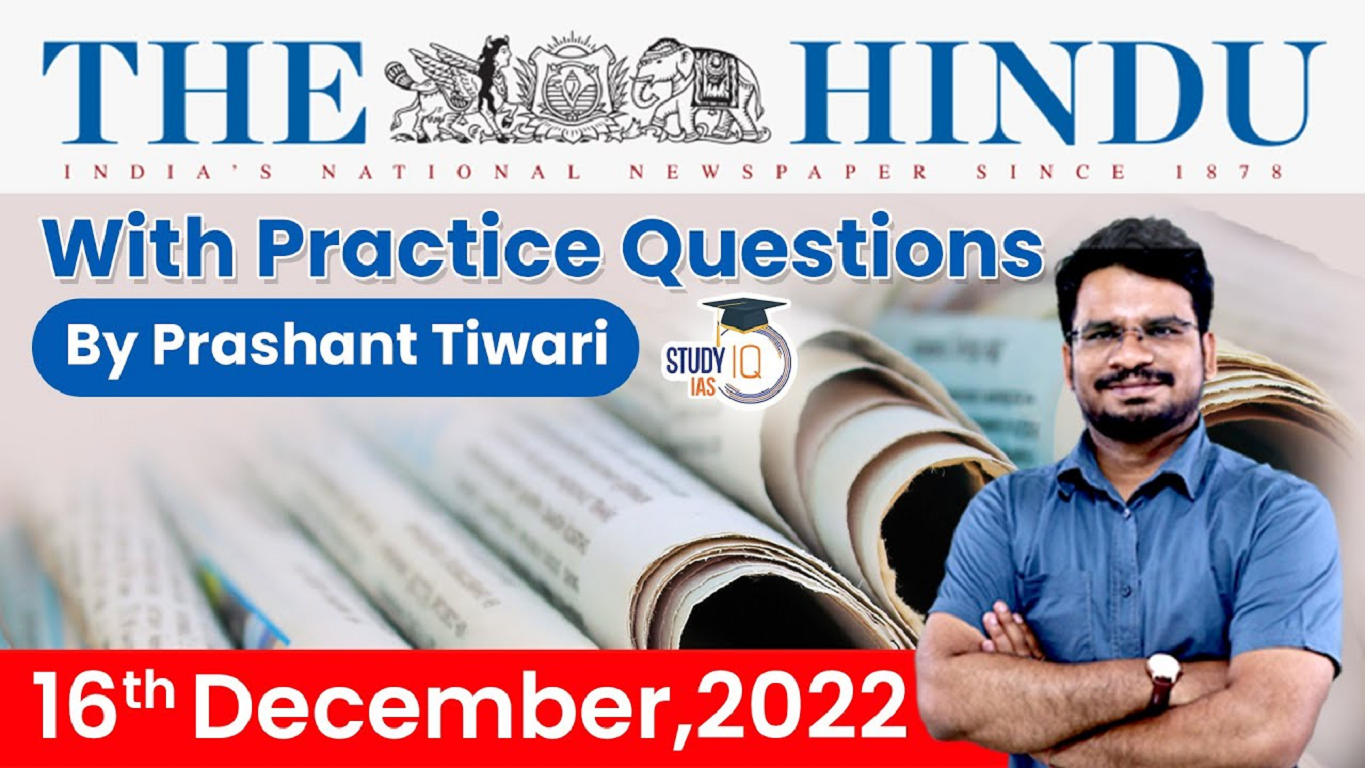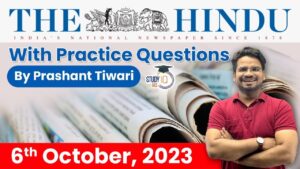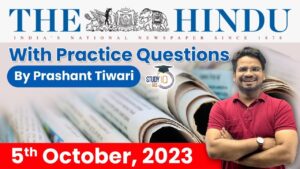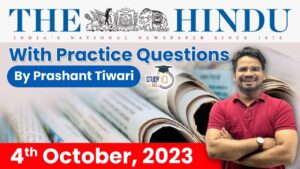The Hindu Newspaper Analysis for UPSC
- China has set up a ropeway near the Torsa Nala on its side of the India-Bhutan-China tri-junction, and is strengthening roads and other infrastructure along the entire eastern sector, according to defence sources.
- In the Yangtse area of Tawang sector in Arunachal Pradesh, which saw a scuffle last week, defence officials with knowledge of the area said China had stepped up patrols some years ago to assert its claims in the area, after finding that their grazers could not move in and out. “What irks the People’s Liberation Army (PLA) is that the Indian Army holds the dominating heights which give a complete view of the bowl,” noted two of the sources.
- The States are empowered to enact personal laws that decide issues such as succession, marriage and divorce, in their endeavour to secure a uniform civil code (UCC), Law Minister Kiren Rijiju informed the Rajya Sabha on Thursday.
- The Minister made these remarks in a written reply to a question posed by Communist Party of India (Marxist) member John Brittas, asking whether the Centre was aware of the States formulating their own laws with respect to the uniform civil code.
- “Yes, sir,” said Mr. Rijiju, “Article 44 of the Constitution provides that the State shall endeavour to secure for the citizens a uniform civil code throughout the territory of India.”
- Rijiju added, “Personal laws such as intestacy and succession, wills, joint family and partition, marriage and divorce, relate to Entry 5 of List-III-Concurrent List of the Seventh Schedule to the Constitution, and hence, the States are also empowered to legislate upon them.”
About:
- UCC is envisaged to provide for one law for the entire country, applicable to all religious communities in their personal matters such as marriage, divorce, inheritance, adoption etc.
- Article 44 of the Constitution lays down that the state shall endeavour to secure a UCC for the citizens throughout the territory of India.
- Article 44 is one of the Directive Principles of State Policy (DPSP).
- The purpose behind Article 44 is to strengthen the object of “secular democratic republic” as enshrined in the Preamble of the Constitution.
Constituent Assembly about the UCC:
- Sub-committee on fundamental rights(headed by Sardar Vallabhbhai Patel): It decided that securing a UCC was not within the scope of fundamental rights.
- Member Naziruddin Ahmad from Bengal:UCC would come in the way of Article 19 of the draft Constitution-now Article 25(which guarantees the right to freedom of religion subject to public order, morality, and health).
- Member K.M. Munshi: UCC will promote the unity of the nation and equality for women.
- R. Ambedkar:He stated that the Article “merely” proposed that the state shall endeavor to secure a UCC, which means it would not impose it on all citizens.
- The President of India, Draupadi Murmu, and the Vice-President of India, Jagdeep Dhankhar, have weighed in on the surpassing significance of the separation of powers in the Indian Constitution. However, both did so in different ways, in substance and style.
- Doctrine of Separation of Powers
- States reverting to OPS can achieve some short-term gains as they need not put up the matching contribution of 10% towards employee pension funds. But with a greying population, the burden of payments will fall on future generations.
- Old Pension Scheme works as electoral strategy but is imprudent fiscal policy
OPS Vs NPS: Basic Difference
- — Under the OPS, retired employees received 50 per cent of their last drawn salary as monthly pensions. NPS is a contributory pension scheme under which employees contribute 10 per cent of their salary (Basic + Dearness Allowance). The Government contributes 14 per cent towards the employees’ NPS accounts.
- — In a nutshell, the detractors of the OPS argue that it is fiscally unsustainable — that is, governments in India do not have the money to fund it — while the detractors of NPS call NPS politically unsustainable — that is, it fails to address the felt needs of the people.
- The scheme assures life-long income, post-retirement.
- Under the old scheme, employees get a pension under a pre-determined formula which is equivalent to 50% of the last drawn salary. They also get the benefit of the revision of Dearness Relief (DR), twice a year. The payout is fixed and there was no deduction from the salary.
- The Government bears the expenditure incurred on the pension. The scheme was discontinued in 2004.
- For example, if a government employee’s basic monthly salary at the time of retirement was Rs 10,000, she would be assured of a pension of Rs 5,000.
- The scheme assures life-long income, post-retirement.
- Under the old scheme, employees get a pension under a pre-determined formula which is equivalent to 50% of the last drawn salary. They also get the benefit of the revision of Dearness Relief (DR), twice a year. The payout is fixed and there was no deduction from the salary.
- The Government bears the expenditure incurred on the pension. The scheme was discontinued in 2004.
- For example, if a government employee’s basic monthly salary at the time of retirement was Rs 10,000, she would be assured of a pension of Rs 5,000.
What is the Right to Information (RTI) Act?
About:
- The Right to Information Act 2005 mandates timely response to citizen requests for government information.
- The basic object of the Right to Information Act is to empower the citizens, promote transparency and accountability in the working of the Government, contain corruption, and make our democracy work for the people in a real sense.
Right to Information (Amendment) Act, 2019:
- It provided that the Chief Information Commissioner and an Information Commissioner (of Centre as well as States) shall hold office for such term as prescribed by the Central Government. Before this amendment, their term was fixed for 5 years.
- It provided that the salary, allowances and other service conditions of the Chief Information Commissioner and an Information Commissioner (of Centre as well as States) shall be such as prescribed by the Central Government.
- Central Information Commission:
- Established by the Central Government in 2005, under the provisions of the Right to Information Act (2005).
- Members: The Commission consists of a Chief Information Commissioner and not more than ten Information Commissioners.
- Appointment: They are appointed by the President on the recommendation of a committee consisting of the Prime Minister as Chairperson, the leader of the single largest Opposition party in the Lok Sabha and a Union Cabinet Minister nominated by the Prime Minister.
- Tenure: The Chief Information Commissioner and an Information Commissioner shall hold office for such term as prescribed by the Central Government or until they attain the age of 65 years, whichever is earlier.
- India on Thursday successfully test-fired nuclear-capable surface-to-surface ballistic missile Agni-V that can strike targets at ranges up to 5,000 km, marking a significant boost to the country’s strategic deterrence, people familiar with the development said.
- The test-firing of the missile from the APJ Abdul Kalam Island off Odisha coast comes amid India’s lingering border row with China.
- Agni-V can bring almost the entire Asia including the northernmost part of China and regions in Europe under its striking range.
What is I2U2?
- I2U2 stands for India, Israel, the UAE, and the US, and was also referred to as the ‘West Asian Quad’.
- I2U2 was initially formed in October, 2021 following the Abraham Accords, to deal with issues concerning maritime security, infrastructure and transport.
- The Abraham Accord is the first Arab-Israeli peace deal in 26 years mediated by the USA.
- India has six large airsheds, some of them shared with Pakistan, between which air pollutants move. While existing measures by the government can reduce particulate matter, significant reduction is possible only if the territories spanning the airsheds implement coordinated policies, says a report by the World Bank made public on Thursday.
- When the wind direction was predominantly northwest to the southeast, 30% of the air pollution in Indian Punjab came from the Punjab Province in Pakistan and, on average, 30% of the air pollution in the largest cities of Bangladesh (Dhaka, Chittagong, and Khulna) originated in India. In some years, substantial pollution flowed in the other direction across borders.
Q) Consider the following statements.
- The Prisons Act empowers States to make rules “for the shortening of sentences” and “for rewards for good conduct”.
- Prisons and reformatories fall in the Concurrent List of the Seventh Schedule of the Constitution.
Which of the above statements is/are correct?
- 1 only
- 2 only
- Both 1 and 2
- Neither 1 nor 2
निम्नलिखित कथनों पर विचार करें।
- कारागार अधिनियम राज्यों को “सजा कम करने के लिए” और “अच्छे आचरण के लिए पुरस्कार के लिए” नियम बनाने का अधिकार देता है।
- जेल और सुधार गृह संविधान की सातवीं अनुसूची की समवर्ती सूची में आते हैं।
उपरोक्त कथनों में से कौन-सा/से सही है/हैं?
- केवल 1
- केवल 2
- 1 और 2 दोनों
- न तो 1 और न ही 2
- The Prisons Act, 1894, and the Prisoners Act, 1900, did not contain any specific provision pertaining to parole and/or furlough. However, Section 59 of the Prisons Act empowers States to make rules inter alia “for the shortening of sentences” and “for rewards for good conduct”.
- Since “prisons, reformatories…” fall in the State List of the Seventh Schedule of the Constitution, States are well within their reach to legislate on issues related to prisons.
Q) Consider the following statements about Central Bureau of Investigation:
- It operates under the jurisdiction of the Ministry of Home Affairs.
- It is exempted from the provisions of the Right to Information Act.
- It is India’s officially designated single point of contact for liaison with the Interpol.
Which of the statements given above is/are correct?
- 1 and 2 only
- 3 only
- 2 and 3 only
- 1, 2 and 3
केंद्रीय जांच ब्यूरो के बारे में निम्नलिखित कथनों पर विचार करें:
- यह गृह मंत्रालय के अधिकार क्षेत्र में कार्य करता है।
- इसे सूचना का अधिकार अधिनियम के प्रावधानों से छूट प्राप्त है।
- यह इंटरपोल के साथ संपर्क के लिए भारत का आधिकारिक तौर पर नामित एकल बिंदु है।
ऊपर दिए गए कथनों में से कौन सा/से सही है/हैं?
- केवल 1 और 2
- केवल 3
- केवल 2 और 3
- 1, 2 और 3
Explanation:
- The Central Bureau of Investigation (CBI) is the premier investigating agency of India.
- It operates under the jurisdiction of the Ministry of Personnel, Public Grievances and Pensions.
- CBI is exempted from the provisions of the Right to Information Act.
- CBI is India’s officially designated single point of contact for liaison with the Interpol.
Q) Recently, which one of the following has launched a “Toolkit on Enabling Gender Responsive Urban Mobility and Public Spaces in India” ?
- UN Women
- United Nations Human Settlement Programme
- World Bank
- World Economic Forum
हाल ही में, निम्नलिखित में से किसने “भारत में लिंग उत्तरदायी शहरी गतिशीलता और सार्वजनिक स्थानों को सक्षम करने पर टूलकिट” लॉन्च किया है?
- संयुक्त राष्ट्र महिला
- संयुक्त राष्ट्र मानव निपटान कार्यक्रम
- विश्व बैंक
- विश्व आर्थिक मंच
Explanation:
- World Bank launched a “Toolkit on Enabling Gender Responsive Urban Mobility and Public Spaces in India” with the aim of suggesting ways to make public transport in Indian cities more inclusive of women’s travelling requirements.
Q) With reference to ISRO’S NAVIC, consider the following statements:
- It is designed with a constellation of 7 satellites.
- NavIC-based trackers are compulsory on commercial vehicles in India.
Which of the above statements is/are correct?
- 1 only
- 2 only
- Both 1 and 2
- Neither 1 nor 2
ISRO के NAVIC के संदर्भ में, निम्नलिखित कथनों पर विचार करें:
- इसे 7 उपग्रहों के समूह से डिजाइन किया गया है।
- भारत में वाणिज्यिक वाहनों पर नाविक आधारित ट्रैकर अनिवार्य हैं।
उपरोक्त कथनों में से कौन-सा/से सही है/हैं?
- केवल 1
- केवल 2
- 1 और 2 दोनों
- न तो 1 और न ही 2
Explanation:
- S1: NavIC is designed with a constellation of 7 satellitesand a network of ground stations operating 24 x 7.
- S2: In April 2019, the Union Ministry of Road Transport and Highways made NavIC-based vehicle trackers mandatory for all commercial vehicles in the country. In August 2021, DGCA updated the drone rules for India under which it became mandatory to use made-in-India technologies, including NavIC.
Q) `SWAYAM’, an initiative of the Government of India, aims at
- promoting the Self Help Groups in rural areas
- providing financial and technical assistance to young start-up entrepreneurs
- promoting the education and health of adolescent girls
- providing affordable and quality education to the citizens for free
‘स्वयं’, भारत सरकार की एक पहल का उद्देश्य है
- ग्रामीण क्षेत्रों में स्वयं सहायता समूहों को बढ़ावा देना
- युवा स्टार्ट-अप उद्यमियों को वित्तीय और तकनीकी सहायता प्रदान करना
- किशोरियों की शिक्षा और स्वास्थ्य को बढ़ावा देना
- नागरिकों को मुफ्त में सस्ती और गुणवत्तापूर्ण शिक्षा प्रदान करना
Explanation:
- SWAYAM is an Information Technology platform which will host Massive Open Online Courses (MOOCs) and provide high quality education on various subjects from school level–class 9-12 to Under Graduate and Postgraduate students– covering all disciplines.
- Through this scheme the Ministry has proposed to provide high quality e-content to all colleges and universities free of cost.
Mains Practice Question:
Q) “The conflict between agreement and disagreement is the first and foremost sign of a healthy democracy”, Analyse the statement. (150 words)
“सहमति और असहमति के बीच संघर्ष एक स्वस्थ लोकतंत्र की पहली और सबसे महत्वपूर्ण निशानी है”, इस कथन का विश्लेषण कीजिए। (150 शब्द)
Introduction:
- The Right to Dissent is an important addition of expressing one’s view, and on many of its most important constituent elements. It will enable practitioners and citizens to claim their rights and participate more effectively in the project of democracy. Disagreeing with each other is a fundamental human trait. There is not a single individual who does not disagree with something or the other all the time. The apex court said, Dissent is a safety valve for democracy. If this safety valve is not allowed to function then the pressure cooker will burst.
Body:
Dissent is the safety valve of democracy:
- Recently, while hearing a petition on the ban of protest on the Jantar Mantar in New Delhi, the SC held that Right to peaceful protest is the fundamental right guaranteed under the constitution.
- The constitution under Article 19(1)(a) provides for freedom of speech and expression and also under Article 19(2) provides for reasonable restrictions on such freedom.
- This particular right is also subject to reasonable restrictions in the interest of sovereignty and integrity of India, as well as public order.
- A distinguishing feature of any democracy is the space offered for legitimate dissent, which cannot be trampled by any executive action.
- Importance of dissent:
-
- The importance of dissent is not just that it is good for democracy. There is also a fundamental ethical principle involved in dissent
- Any society which muzzles dissent is acting unethically.
- The first ethical principle is related to non-violence, a principle which is so integral to the unique Indian practices of dissent from ancient times to Gandhi and Ambedkar.
- The second ethical principle is that the worse off in a society have a greater right to dissent and protest even when the more privileged may not agree or sympathise with that dissent.
Conclusion:
- The course of democracy anywhere in the world is defined by events that test the resilience of democracy and also add to it.
- Indeed, dissent is the quintessential part of democracy and allows people to have their opinions and to voice those without fear of intimidation.
Mains Practice Question:
Q) Individual Parliamentarian’s role as the national law maker is on a decline, which in turn, has adversely impacted the quality of debates and their outcome. Discuss. (150 words)
राष्ट्रीय कानून निर्माता के रूप में व्यक्तिगत सांसद की भूमिका में गिरावट आ रही है, जिसने बहस की गुणवत्ता और उनके परिणामों पर प्रतिकूल प्रभाव डाला है। विचार-विमर्श करना। (150 शब्द)


 The Hindu Newspaper Analysis 6 October 2...
The Hindu Newspaper Analysis 6 October 2...
 The Hindu Newspaper Analysis 5 October 2...
The Hindu Newspaper Analysis 5 October 2...
 The Hindu Newspaper Analysis 4 October 2...
The Hindu Newspaper Analysis 4 October 2...





















